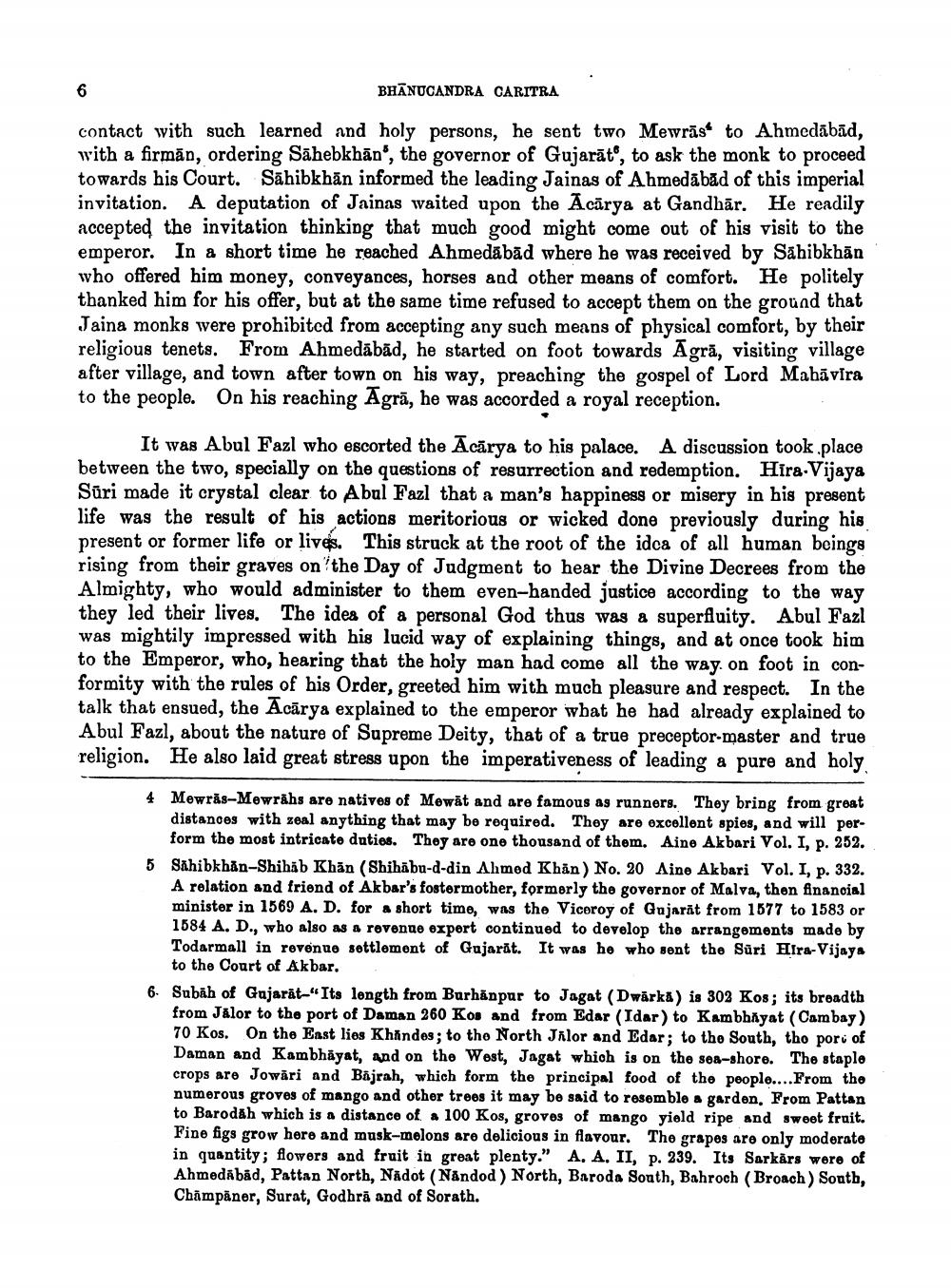________________
BHĀNUCANDRA CARITRA
contact with such learned and holy persons, he sent two Mewrāsto Ahmedābād, with a firmān, ordering Sāhebkhān', the governor of Gujarāto, to ask the monk to proceed towards his Court. Sāhibkhān informed the leading Jainas of Ahmedabad of this imperial invitation. A deputation of Jainas waited upon the Acārya at Gandhār. He readily accepted the invitation thinking that much good might come out of his visit to the emperor. In a short time he reached Ahmedabād where he was received by Sāhibkhān who offered him money, conveyances, horses and other means of comfort. He politely thanked him for his offer, but at the same time refused to accept them on the ground that Jaina monks were prohibited from accepting any such means of physical comfort, by their religious tenets. From Ahmedābād, he started on foot towards Agră, visiting village after village, and town after town on his way, preaching the gospel of Lord Mahāvira to the people. On his reaching Agrā, he was accorded a royal reception.
It was Abul Fazl who escorted the Acārya to his palace. A discussion took place between the two, specially on the questions of resurrection and redemption. Hira-Vijaya Sūri made it crystal clear to Abul Fazl that a man's happiness or misery in his present life was the result of his actions meritorious or wicked done previously during his present or former life or lives. This struck at the root of the idea of all human beings rising from their graves on the Day of Judgment to hear the Divine Decrees from the Almighty, who would administer to them even-handed justice according to the way they led their lives. The idea of a personal God thus was a superfluity. Abul Fazl was mightily impressed with his lucid way of explaining things, and at once took him to the Emperor, who, hearing that the holy man had come all the way. on foot in conformity with the rules of his Order, greeted him with much pleasure and respect. In the talk that ensued, the Acārya explained to the emperor what he had already explained to Abul Fazl, about the nature of Supreme Deity, that of a true preceptor-master and true religion. He also laid great stress upon the imperativeness of leading a pure and holy,
4 Mewrăs-Mewrähs are natives of Mowāt and are famous as runners. They bring from great
distances with zeal anything that may be required. They are excellont spies, and will perform the most intricate duties. They are one thousand of them. Aine Akbari Vol. I, p. 252. Sahibkhăn-Shihab Khăn (Shihabu-d-din Ahmed Khan) No. 20 Aine Akbari Vol. I, p. 332. A relation and friend of Akbar's fostermother, formerly the governor of Malva, then financial minister in 1569 A. D. for a short time, was the Viceroy of Gujarat from 1677 to 1583 or 1584 A, D., who also as a revende export continued to develop the arrangements made by Todarmall in revenuo sottlomont of Gujarat. It was ho who sont the Suri Hira-Vijaya
to the Court of Akbar, 6. Subah of Gujarat-"Its length from Burhanpur to Jagat (Dwarka) is 302 Kos; its breadth
from Jalor to the port of Daman 260 Kos and from Edar (Idar) to Kambhiyat (Cambay) 70 Kos. On the East lies Khandes; to the North Jilor and Edar; to the South, tho pori of Daman and Kambhayat, and on the West, Jagat which is on the sea-shore. The staple crops are Jowari and Bajrah, which form the principal food of the peoplo....From the numerous groves of mango and other trees it may be said to resom ble a gardon. From Pattan to Barodah which is a distance of a 100 Kos, groves of mango yield ripe and sweet fruit. Fine figs grow here and musk-melons are delicious in flavour. The grapes are only moderate in quantity; flowers and fruit in great plenty." A. A. II, p. 239. Its Sarkárs were of Ahmedabad, Pattan North, Nādot (Nåndod ) North, Baroda South, Bahroch (Broach) South, Champāner, Surat, Godhra and of Sorath.




